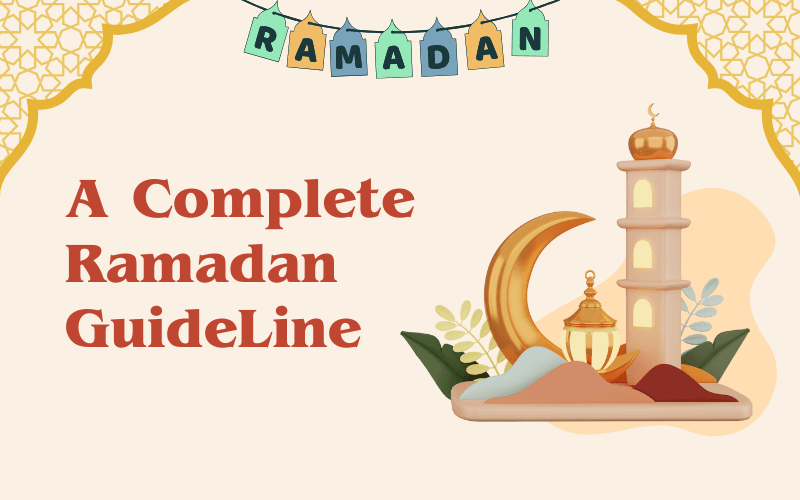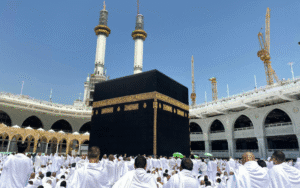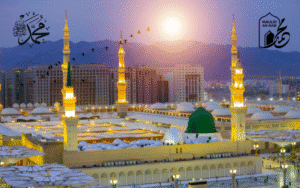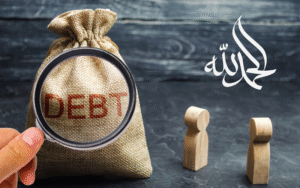Ramadan Guide: A Journey of Faith, Fasting, and Self-Purification

In the Islamic lunar calendar, the ninth month, the holy month of Ramadan, stands as a divine gift from Allah Almighty to the Muslim Ummah (community). It is a special provision of mercy, forgiveness, and salvation from the Hellfire. This is not just a month of fasting; it is a heavenly opportunity for self-purification, spiritual training, and re-establishing the sacred bond with our Lord. It was in this blessed month that the ultimate source of guidance, the Holy Quran, was revealed to illuminate humanity, serving as the perfect Ramadan guide. Humanity was lost in the darkness of disbelief. For this reason, Ramadan is the best of months, a time that simplifies the path for a believer to draw closer to Allah.
Part 1: The Fundamental Importance of Ramadan
The profound importance of Ramadan is clearly articulated in the Quran and the Hadith (sayings and traditions of the Prophet Muhammad ﷺ).
The Month of Quranic Revelation: A Beacon of Guidance
The primary reason for Ramadan’s supreme status is that it is the month in which the guide for all humanity, the Quran, was revealed. Allah Almighty states:
شَهْرُ رَمَضَانَ الَّذِي أُنزِلَ فِيهِ الْقُرْآنُ هُدًى لِّلنَّاسِ وَبَيِّنَاتٍ مِّنَ الْهُدَىٰ وَالْفُرْقَانِ
The month of Ramadan is that in which was revealed the Qur’an, a guidance for the people and clear proofs of guidance and criterion.
(Quran, Surah Al-Baqarah: 185)
It is by embracing the Quran that people recognize the supremacy of Tawhid (the Oneness of Allah). They also find the opportunity to gain nearness to Allah by following the straight path.
Siyam (Fasting): The Foundation of Taqwa
The second fundamental aspect of Ramadan is the obligation of Siyam (fasting). This is one of the five pillars of Islam. The core purpose of fasting is to attain Taqwa (God-consciousness, piety, and self-restraint). Allah Almighty says:
يَا أَيُّهَا الَّذِينَ آمَنُوا كُتِبَ عَلَيْكُمُ الصِّيَامُ كَمَا كُتِبَ عَلَى الَّذِينَ مِن قَبْلِكُمْ لَعَلَّكُمْ تَتَّقُونَ
O you who have believed, decreed upon you is fasting as it was decreed upon those before you that you may achieve Taqwa.
(Quran, Surah Al-Baqarah: 183)
The Month of Self-Purification and Training
Ramadan serves as an annual training course for the believer. It is a time not just to abstain from food and drink, but also to purify the soul. This is done by refraining from all forms of sin, falsehood, obscenity, conflict, and evil deeds. The Messenger of Allah (ﷺ) said:
“Whoever does not give up false speech and evil actions, Allah has no need of his leaving his food and drink.”
(Sahih al-Bukhari, 1903)
Part 2: The Unparalleled Virtues and Rewards of Ramadan
During this month, Allah opens the doors to countless rewards and virtues for His servants. This comprehensive Ramadan Guide outlines these virtues.
The Golden Door to Mercy, Forgiveness, and Salvation
The Messenger of Allah (ﷺ) gave the good tidings of Ramadan’s arrival. He said:
“When the month of Ramadan begins, the gates of Heaven are opened, the gates of Hell are closed, and the devils are chained.”
(Sahih al-Bukhari, 3277)
The Month of Forgiveness for Sins
Ramadan presents an extraordinary opportunity to have one’s past sins erased. The Messenger of Allah (ﷺ) said:
“Whoever fasts during Ramadan out of sincere faith and hoping to attain Allah’s rewards, all his past sins will be forgiven.”
(Sahih Muslim, 760)
The Special Gate of Paradise, ‘Ar-Rayyan’
Allah has designated a special gate in Paradise to honor those who fast. Only they will enter through it. The Messenger of Allah (ﷺ) said:
“In Paradise there is a gate called Ar-Rayyan, and those who observe fasts will enter through it on the Day of Resurrection, and none except them will enter through it.”
(Sahih al-Bukhari, 1896)
Part 3: Spiritual Ascent and Closeness to Allah
Ramadan is the month for bridging the distance between a person and their Creator. This fosters a deep sense of closeness. This spiritual Ramadan Guide helps you navigate this journey.
Re-establishing the Relationship with Allah
Throughout the year, negligence and worldliness can create a distance in the servant’s relationship with Allah. Ramadan provides the chance to restore this connection. Through fasting, a servant sincerely forsakes their desires solely for Allah. In a Hadith Qudsi (a direct revelation from Allah), Allah Almighty says:
“Fasting is for Me, and I Myself will give its reward. The fasting person gives up his desire and his food for My sake.”
(Sahih al-Bukhari, 7492)
Tawbah (Repentance): The Golden Opportunity to Return
When a person truly comprehends the eternal nature of the Hereafter, they are inspired to turn to Tawbah (repentance). The fleetingness of this worldly life is also understood. This realization intensifies during Ramadan. The Messenger of Allah (ﷺ) illustrated the vastness of the Hereafter with an analogy:
“The likeness of this world in comparison to the Hereafter is that of a person who dips his finger in the sea and sees how much water he brings out.”
(Sahih Muslim, 2858)
When a repentant servant turns back to Allah, Allah turns to them even faster. The Messenger of Allah (ﷺ) said that Allah says: “…If he comes to Me walking, I go to him at speed.”
(Sahih Muslim, 2675)
The Struggle Against the Self (Nafs)
The Nafs (the self or ego) constantly inclines a person towards comfort, desires, obscenity, and disobedience to Allah. In Ramadan, the struggle against these inclinations becomes easier. This is because the devils are chained. The Prophet (ﷺ) said:
“When Ramadan begins, the gates of Heaven are opened… and the devils are chained.”
(Sahih al-Bukhari, 3277)
Allah loves the servant who is victorious in this struggle. This makes them beloved to the inhabitants of the heavens and the earth.
Part 4: Laylatul Qadr – A Night Better Than a Thousand Months
The greatest blessing of Ramadan is Laylatul Qadr (The Night of Decree).
The Majesty of Qadr
Worship performed in this single night is superior to the worship of a thousand months (83 years and 4 months). Allah Almighty says:
إِنَّا أَنزَلْنَاهُ فِي لَيْلَةِ الْقَدْرِ. وَمَا أَدْرَاكَ مَا لَيْلَةُ الْقَدْرِ. لَيْلَةُ الْقَدْرِ خَيْرٌ مِّنْ أَلْفِ شَهْرٍ
“Indeed, We sent the Qur’an down during the Night of Decree. And what can make you know what is the Night of Decree? The Night of Decree is better than a thousand months.”
(Quran, Surah Al-Qadr: 1-3)
The Importance of Seeking Qadr
This magnificent night is most likely to occur on the odd-numbered nights of the last ten days of Ramadan. `Aisha (may Allah be pleased with her) reported that the Messenger of Allah (ﷺ) would practice I’tikaf (seclusion in the mosque) during the last ten days of Ramadan. He would say,
“Seek out Laylatul Qadr in the last ten nights of Ramadan.”
(Sahih Muslim, 1172)
The Special Laylatul Qadr Dua
`Aisha (may Allah be pleased with her) asked the Prophet (ﷺ):
“O Messenger of Allah, if I know which night is Laylatul Qadr, what should I say during it?” He (ﷺ) said: “Say: Allahumma innaka ‘afuwwun tuhibbul-‘afwa, fa’fu ‘anni” (O Allah, You are Pardoning and love to pardon, so pardon me). This powerful laylatul qadr dua is a perfect way to seek forgiveness.
(Ahmad, Ibn Majah, 3850)
Part 5: Our Actions and Prohibitions: A Ramadan Guide to Ramadan Fasting Rules
To reap the full blessings of Ramadan, it is essential to perform certain acts with devotion and strictly avoid others.
What to Do:
- Sincerity of Intention: Fast solely for the pleasure of Allah.
- Congregational Prayers: Perform the five daily prayers in congregation (for men at the mosque).
- Taraweeh and Tahajjud: Dedicate yourself to the night prayers.
- Quran Recitation and Study: Read the Quran with understanding of its meaning.
- Charity (Sadaqah): Be generous in giving. The Prophet (ﷺ) was the most generous of people, especially in Ramadan.
- Zikr and Dua: Constantly remember Allah and make supplications. This is especially important before breaking the fast (Iftar) and during the pre-dawn meal (Suhur).
- I’tikaf: Performing seclusion in the mosque during the last ten days is a profound Sunnah (prophetic practice).
What to Avoid: Fasting is not just abstinence from food and drink; it is also the fasting of the limbs. The Messenger of Allah (ﷺ) said:
“Fasting is a shield. So, the person observing fasting should avoid obscene speech and ignorant behavior.”
[Sahih al-Bukhari, 1894]
Therefore, it is mandatory to refrain from lying, backbiting, arguing, and watching or listening to anything indecent. All other forbidden acts should also be avoided. Otherwise, the fast risks becoming mere starvation.
Part 6: Sadaqatul Fitr and the Fasts of Shawwal
Sadaqatul Fitr: This is an obligatory charity. It is paid to atone for minor shortcomings during the fast and to provide food for the needy on the day of Eid. It must be paid before the Eid prayer in the form of staple food items (like dates, barley, raisins, or rice) equivalent to one Sa’ (approximately 5.5 to 6.6 lbs).
(Sahih al-Bukhari, 1503, 1506)
The Six Fasts of Shawwal: Fasting six days in the month of Shawwal (the month following Ramadan) carries a reward. This reward is equivalent to fasting for the entire year. The Messenger of Allah (ﷺ) said:
“Whoever fasts Ramadan and then follows it with six days of Shawwal, it will be as if he fasted for a lifetime.”
(Sahih Muslim, 1164)
Conclusion:
The month of Ramadan is a vast ocean of Allah’s mercy. It is a month-long training opportunity. The Taqwa, patience, and self-restraint we acquire are meant to guide our lives for the remaining eleven months. We must seize every moment of this blessed month. We should draw closer to Allah, seek forgiveness for our sins, and begin a new, purified life. This Ramadan Guide will hopefully serve you in that effort. May Allah Almighty grant us all the ability to understand the importance and virtues of Ramadan, to observe its fasts correctly, and to earn His pleasure. Ameen.
Frequently Asked Questions
What is the primary purpose of fasting in Ramadan?
The primary purpose of fasting in Ramadan is to attain Taqwa (God-consciousness, piety, and self-restraint). By abstaining from food, drink, and desires from dawn until sunset, a person learns discipline, purifies their soul, and strengthens their connection with Allah.
What is Laylatul Qadr, and why is it so important?
Laylatul Qadr (The Night of Decree) is a special night in the last ten days of Ramadan. It is so important because worship performed on this single night is better than the worship of a thousand months. It is believed to be the night when the Quran was first revealed.
What is Sadaqatul Fitr, and when should it be paid?
Sadaqatul Fitr is an obligatory charity paid at the end of Ramadan. Its purpose is to purify the fasting person from minor errors and to provide food for the needy on the day of Eid al-Fitr. It must be paid before the Eid prayer, typically in the form of staple food items.
What else should a person avoid besides food and drink during fasting?
Fasting is not only about abstaining from food and drink; it is also about the "fasting of the limbs." To reap the full rewards of a fast, a person must also strictly refrain from all forms of sin, including lying, backbiting, arguing, and engaging in indecent behavior. The Prophet (ﷺ) stated that whoever does not give up false speech and evil actions has not truly fasted.









